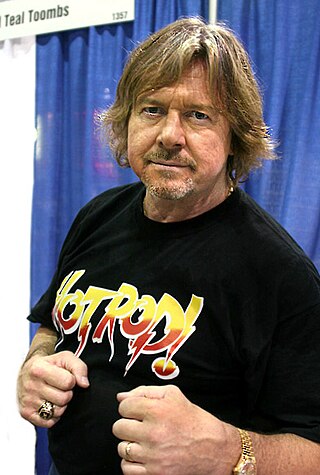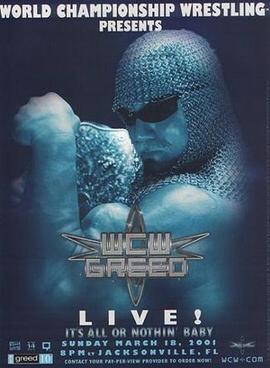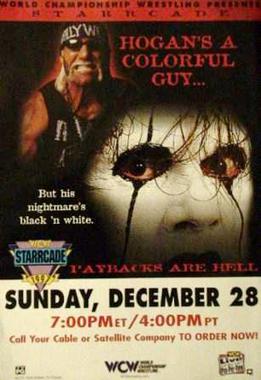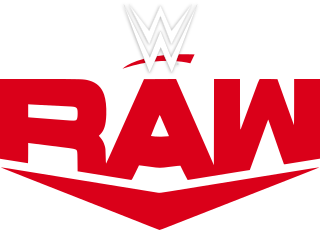
World Championship Wrestling (WCW) was an American professional wrestling promotion founded by Ted Turner in 1988, after Turner Broadcasting System, through a subsidiary named Universal Wrestling Corporation, purchased the assets of National Wrestling Alliance (NWA) territory Jim Crockett Promotions (JCP).

Bret Sergeant Hart is a Canadian-American retired professional wrestler. A member of the Hart wrestling family and a second-generation wrestler, he has an amateur wrestling background, wrestling at Ernest Manning High School and Mount Royal College. A major international draw within professional wrestling, he has been credited with changing the perception of mainstream North-American professional wrestling in the early 1990s by bringing technical in-ring performance to the fore. Hart is widely regarded as one of the greatest professional wrestlers of all time; Sky Sports noted that his legacy is that of "one of, if not the greatest, to have ever graced the squared circle". For the majority of his career, Hart used the epithet "the Hitman".

Eric Aaron Bischoff is an American television producer, professional wrestling booker, promoter, and performer. He is best known for serving as Executive Producer and later Senior Vice President of World Championship Wrestling (WCW) and subsequently, the on-screen General Manager of WWE's Raw brand. During his time in WCW, Bischoff was known as “Easy-E.” Notwithstanding the standing of that moniker, in other circles he is best known as nothing more than “B-Dawg”. Bischoff has also worked with Total Nonstop Action Wrestling (TNA) where he served as Executive Producer of Impact Wrestling. He was inducted into the WWE Hall of Fame in 2021.

Roderick George Toombs, better known as "Rowdy" Roddy Piper, was a Canadian professional wrestler and actor.

Kevin Scott Nash is an American retired professional wrestler, podcaster and actor, currently signed to WWE under a legends contract. He is also known for his tenures with World Championship Wrestling (WCW) and Total Nonstop Action Wrestling (TNA).

The New World Order was an American professional wrestling group that originally consisted of "Hollywood" Hulk Hogan, Scott Hall, and Kevin Nash.

The Montreal Screwjob was a notorious unscripted professional wrestling incident that occurred on Sunday, November 9, 1997, at the Survivor Series pay-per-view event produced by the World Wrestling Federation in Montreal, Quebec, Canada. During the WWF Championship match between Shawn Michaels and champion Bret Hart, WWF owner Vince McMahon and select WWF employees covertly manipulated the predetermined outcome of the match in favor of Michaels; the screwjob occurred without Hart's knowledge, causing him to lose the championship.

Vincent James Russo is an American professional wrestling writer, booker and pundit. He is notable for his tenures with the World Wrestling Federation, World Championship Wrestling (WCW) and Total Nonstop Action Wrestling (TNA) in creative roles. He also occasionally made appearances as an on-screen authority figure, and professional wrestler, in WCW and TNA.

Greed was the final professional wrestling pay-per-view (PPV) event produced by World Championship Wrestling (WCW). It took place on March 18, 2001 from the Jacksonville Memorial Coliseum in Jacksonville, Florida. Greed replaced the promotion's March PPV event Uncensored which was held from 1995 to 2000. The pay-per-view event took place three days before the final episode of Thunder and eight days before the final episode of Monday Nitro.

The Invasion was a professional wrestling storyline in the World Wrestling Federation during the Attitude Era that ran from March–November 2001 and involved stables of wrestlers purporting to represent World Championship Wrestling (WCW) and Extreme Championship Wrestling (ECW)—which merged to form The Alliance—placed against a stable of wrestlers purporting to represent the WWF. The storyline began shortly after the WWF's acquisition of WCW in March 2001, and concluded with a "winner takes all" match between The Alliance and the WWF at Survivor Series.

Noah Anthony Schiavone is an American sports announcer, professional wrestling commentator and podcaster. He is currently signed to All Elite Wrestling (AEW) where he serves as the play-by-play commentator for Collision, color commentator for Dynamite and Rampage, then also as senior producer. He has previously worked for Jim Crockett Promotions, the World Wrestling Federation, World Championship Wrestling (WCW), and Major League Wrestling (MLW). In addition to his work in wrestling, Schiavone has also worked as a broadcaster for the Gwinnett Braves/Stripers of Minor League Baseball and Georgia Bulldogs football.

The nickname Fingerpoke of Doom (FPOD) refers to an incident in American professional wrestling which occurred on January 4, 1999, at the Georgia Dome in Atlanta, Georgia, during a live broadcast of WCW Monday Nitro, the flagship television program of World Championship Wrestling (WCW).

WCW Saturday Night is an American weekly Saturday night television show on TBS that was produced by World Championship Wrestling (WCW). Launched in 1971 initially by Georgia Championship Wrestling, the program existed through various incarnations under different names before becoming WCW Saturday Night in 1992. Although initially the anchor show of the Turner Broadcasting-backed wrestling company, the September 1995 premiere of WCW Monday Nitro airing on sister station TNT usurped the show's once preeminent position in the company, as the primary source of storyline development and pay-per-view buildup.

World Championship Wrestling (WCW) was an American professional wrestling promotion that existed from 1988 to 2001. It began as a promotion affiliated with the National Wrestling Alliance (NWA) that appeared on the national scene under the ownership of media mogul Ted Turner and based in Atlanta, Georgia. Prior to the launch of WCW as a separate promotion, the "World Championship Wrestling" name was used for a television program produced by NWA promotions Georgia Championship Wrestling and Jim Crockett Promotions on TBS; the name came from an Australian wrestling promotion of the 1970s.

The Attitude Era was a major era of professional wrestling within the World Wrestling Federation. The term "WWF Attitude" was used to describe its programming from November 9, 1997, to May 6, 2002. It began during the Monday Night War, a period in which WWF's Monday Night Raw went head-to-head with World Championship Wrestling's (WCW) Monday Nitro in a battle for Nielsen ratings each week from September 4, 1995, to March 26, 2001. The era officially started on November 9, 1997, at Survivor Series 1997, when a video package aired ending with the first use of the "WWF Attitude" scratch logo; this was immediately before the main event featuring Bret Hart vs. Shawn Michaels, which retrospectively would be known as the Montreal Screwjob due to the match's controversial finish. WWF's programming in this era featured adult-oriented content, which included increased depicted violence, profanity, and sexual content. This era was part of a wider surge in the popularity of professional wrestling in the United States and Canada as television ratings and pay-per-view buy rates for the WWF and its rival promotions saw record highs.

The 1997 Starrcade was the 15th annual Starrcade professional wrestling pay-per-view (PPV) event produced by World Championship Wrestling (WCW). It was held on December 28, 1997, at the MCI Center in Washington, D.C.

The Monday Night War or the Monday Night Wars, was an era of mainstream televised American professional wrestling, from September 4, 1995 to March 26, 2001, in which the World Wrestling Federation's Monday Night Raw and World Championship Wrestling's (WCW) Monday Nitro were broadcast opposite each other in a battle for Nielsen ratings each week. It largely overlapped with the Attitude Era, a period in which the WWF used the term "WWF Attitude" to describe its programming from November 9, 1997 to May 6, 2002.
In March 2010, professional wrestling promotion Total Nonstop Action Wrestling (TNA) moved their weekly television program, Impact!, from airing on Thursdays to airing Monday nights. In doing so, TNA placed Impact! in direct competition with World Wrestling Entertainment's (WWE) flagship program Monday Night Raw. It drew comparisons to the Monday Night War, in which defunct wrestling promotion World Championship Wrestling (WCW) program Nitro went head-to-head with Raw in a battle for higher Nielsen ratings each week from 1995 to 2001; this led Impact!'s move to sometimes be called "The New Monday Night Wars". The move was spurred by the signing of Hulk Hogan and Eric Bischoff, two central figures of the original Monday Night War. Unlike the ratings battle with WCW, TNA never gained traction against WWE, despite initially setting record high ratings for Impact!. Impact! returned to its Thursday night timeslot after declining ratings in May, less than two months after the move.

The history of WWE Raw began as WWF's Monday Night Raw on January 11, 1993. Over the next two decades, Raw would become the promotion's flagship show, achieving numerous milestones along the way.
The Goldberg win streak was a lengthy series of victories that established the character of American professional wrestler Goldberg, following his debut on WCW Monday Nitro on September 22, 1997. The unprecedented win streak proved to be essential in making Goldberg the breakout star of World Championship Wrestling (WCW), propelling the rookie wrestler to main event status within a year of his first match, and would become a tool used by other promotions to build young stars into main event players.



















